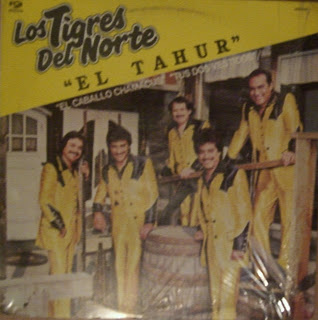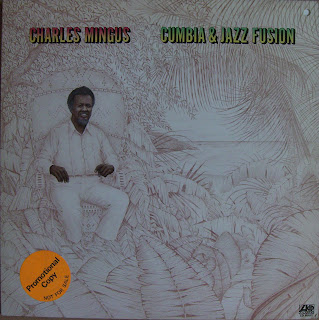
This album comes from Los Tigres' arguably least remembered period following their break into stardom with Contrabando y Traición. Chalino Sanchez had not yet transformed the narcocorrido into the international sensation that it has become. I firmly believe that although Los Tigres were the first to popularize the genre on a large scale, they would not be the superstars they are today without Chalino's help bringing the genre to the Chicano audience. This record contains both corridos and dance songs, and the title track is a ballad about a fair, honest, and respected gambler who one day falls on bad luck and loses everything. When he gets a good hand and feels he can't lose, he bets his wife out of desperation. When his opponent shows four aces, he becomes distraught and takes his own life along with that of his wife to spare them both the pain of his mistake.
El Tahur was written by Adolfo Salas, who as far as I can tell was one of the songwriters who Los Tigres contracted writing responsibilities out to. The song is very unusual in the sense that its protagonist owes his downfall more to fate than social injustice. In this regard, it is different from all other narcocorridos and classic corridos that I have heard. I should go further into the significance of this before I discuss the song. My explanations of two primary subjects in corridos, misfortune and morality, both start in the same place, the divide between what is called la plebada and the elite, or "educated" class, made up of politicians and licenciados, or degree holders. Many see the elite as encompassing American business interests as well. La plebada is a term that roughly correlates to "the people" or the "popular class," a class of people disenfranchised and/ or marginalized in one way or another for one reason or another. In Mexico, la plebada by this definion makes up a large majority of the population.
According to narcocorridos, all cartel members originate in la plebada, even if the drug business eventually makes them rich. Narcocorridos portray the elites as the cumulative holders of legitimate power and the controllers of legitimate industry. The songs allege that these people have no interest in sharing access to economic mobility with la plebada. They blame members of the elite for the actions of cartels, alleging that if poor people had the opportunity to make money through legitimate channels, they would not need to turn to illicit activity. Many narcocorridos also include premonitions of an early death for their protagonists. The idea is that by entering the business, they trade wealth for longevity. In this sense, the elites have sealed the narco's fate from birth: he could follow the law and barely scrape by or try to make something for himself by risking his life. The moral argument that follows is obvious: saying that narcos choose to enter the drug industry might be something of an overstatement, (although some songs do attribute a genuine enthusiasm for violence to their protagonists,) because while violence might be a preferable option to starvation, it is not an easy living compared to that of a politician. Along these lines, narcocorridos portray la plebada as honest and the elites as dishonest. A quick explanation is that the elites rely on twisted language to maintain their power whereas the people are more given to hard work and have no use for dishonesty among themselves. In many narcocorridos, honesty has become a class marker. Narcos who break the laws and mores of the rich do so because this code fundamentally disenfranchises the people. Classic corridos are a little bit different, but the essential facts are the same. The heroes come from the lower class and struggle against powerful outsiders, both Americans and Mexico City elites, but value hard work and honesty among their own people. The main difference is the degree of the protagonists' antiauthoritarianism.
As I say above, fate rather than social injustice led to el tahur's downfall. Given the stigma against heavy gambling in our society, some readers might fully fault the gambler for his loss. However, I believe that Los Tigres intentionally leave the responsibility for the gambler's misfortune ambiguous. Of course, the gambler is at least somewhat accountable because he chose the gambling lifestyle in the first place. The only hint of class identity comes at the beginning of the song when the narrator describes the gambler as "unfailingly honest, a man who knew how to win and lose," i.e. how to take his losses in stride because he was fully aware of the risks he took. As an honest member of la plebada, he would not cheat another member of his own class. Even with his final defeat, the gambler did not try to cheat his opponent out of his winnings by skipping town with his wife and starting over elsewhere. Although he did deprive his opponent of the spoils by killing his wife, the gesture of suicide also indicates that he took responsibility for his actions. To the end, he remained an honest plebe, respecting his gambler's code even after it ruined him. By this logic, he committed no social wrongs and thus did not deserve his sad end in a karmic sense; at most, he was guilty of mismanaging his personal affairs.
This is the extent to which the gambler is responsible for his downfall, but there is still enough blame left over that some of it can be pinned on fate. In order for the gambler to lose his wife, three events had to converge in a single moment. First, the gambler had to lose all his material possessions, so that the only thing he had left in the world was his wife. Second, he had to pick up a hand so strong that there was no doubt in his mind that he would win with it. The song implies that his hand made him so confident that he did not even consider the possibility of losing. Finally, his opponent had to get a nearly unbeatable hand at the same time. The setup was such that any desperate person, even one with no inclination for gambling, could have accepted the nearly negligible risk in order to win some semblance of his life back. By this reading of the story, it was not a rational gambler who lost his wife, but a desperate man. The gambler was guilty of losing almost everything, but fate took his wife from him. What is clear is that whether fate or the gambler is to blame, the rich have nothing to do with the gambler's demise. I consider this song something of an anti-corrido because in the end, it leaves us without a moralistic commentary about class and without a clear moral. Maybe the author means to warn us that fate can strike us when we are most vulnerable. In this sense, this song might not be so far removed from the narcocorrido after all: if the gambler stands in for la plebada by analogy, then even though he played by the rules all along, he ended up with nothing. At the end of the day, he is left with his wife, (read: "life,") to wager, and indeed, when push comes to shove, he is gambling with his own life, much like the narco who risks his life to escape poverty. Maybe I've gone too far looking for meaning where it doesn't exist with this last parallel, but in any case, the very role of fate in this corrido sets it apart.


